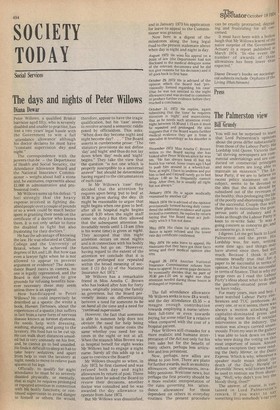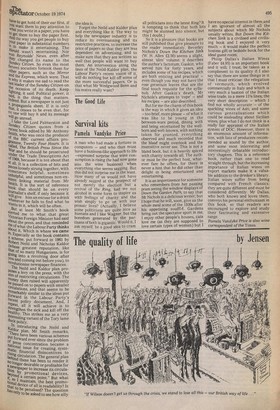Press
The Palmerston view
13111 Grundy
You will not be surprised to learn that Lord Palmerston's opinions about the press differ substantiallY from those of the Labour Party. His Lordship told Queen Victoria that "all thriving newspapers are coinmercial undertakings and are CO ducted on commercial principles and none others are long able to maintain an existence." The Labour Party, if we are to believe its recent policy statement on the subject, seems to be devoted to the idea that the sick should he‘ subsidised out of the revenues 01 the healthy, thus prolonging the life of the poorly and shortening the life of the successful. Couple that With their plans to nationalise the prosperous parts of industry and it looks as though the Labour Party iS keen to re-write Saki: "It was going concern as concerns go, and as concerns go, it went." I digress. Let me get back to Lord Palmerston and the press. Hi5 Lordship was, for sure, writing some time ago, and things mg: have altered since then, but much. Because I think it still remains broadly true that for a paper to be successful in terms df opinion, it has first to be successful in terms of finance. That is why niY gorge rises as I read the Labour Party's ideas about what to do with the parlously-situated press that we have today. For many years, man and boy, I have watched Labour Party conferences and TUC jamborees. At every one, or so it seems, there Was always a motion attacking the_, capitalist-dominated press an° calling for some form of socialist intervention in the industry. The motion was always carried unalw mously. From my seat in the gallery' I was able to look down on those who were doing the voting on this most important of issues. Almost without exception they were reading the Daily Mirror, or the DailY Express. Which is why, whenever a speaker made moan about the death of the Daily Herald or Reynolds' News, wild horses had to be used to restrain me from shouting, "Well, why didn't you buy the bloody thing, then?" The answer, of course, is contained in Lord Palmerston remark. If you want to saY something into somebody's ear yo_Li ...pEczator October 19 1974 have to get hold of their ear fil.st. If You want them to pay attention to What you write in a paper, you have to get them to buy the paper first. And the way you get people to buy Your paper in substantial numbers IS to make it entertaining. The "erold wasn't entertaining. Nor was Reynolds' News, even after they changed its name to the ounday Citizen. So even the most fervent socialists forsook them for Other papers, such as the Mirror ,ancl the Express, which were. That is why it makes me sad to read the last leader of the Sunday Citizen on ,the occasion of its death. Keep lighting, it said. Political power, it said, is the thing that matters. Indeed. But a newspaper is not just
Propaganda sheet. If it is only "'at, it ceases to be even that, for no one will buy it and its message Will go unread.
take the Lord Palmerston and Sunday Citizen quotes from a recent book edited by Mr Anthony Smith, who was once the producer of the BBC current affairs progranime, Twenty Four Hours. It is eal,„ led, The British Press Since the "nr and he should be prosecuted under the Trade Descriptions Act of 1968, because it is not about that at all It is a collection of bits and Pieces loosely strung together, with sometimes helpful, sometimes tirlhelPful, and sometimes non-existent linking material from Mr Smith. It is the sort of reference book that should be on every Journalist's shelf, if only because it Wilt give him an excuse for a drink Whenever he fails to find what he Wants in it, which will be often. But at least Mr Smith's book alerted me to what that great Victorian Foreign Minister had said about the press, and that reminded Me of what the Labour Party thinks about it. Which is where we came ;11' Especially as the book contains. scheme, put forward in 1961 by titlert Neild and Nicholas Kaldor (Whose greatest reputation, like that , of so many Hungarians, is for 5°11Ig into a revolving door after You and coming out before you), to revolutionise newspaper finances. The Neild and Kaldor plan proPoses a levy on the press, with the aim of restricting circulations. The ttnoney then raised will apparently pe Passed on to papers with smaller circulations, and that seems to be remarkably similar to the ideas put forivard in the Labour Party's recent policy document. And, I repeat, all it will achieve is to strengthen the sick and kill off the healthy. This strikes me as a very interesting variant of the Tory lame duck policy, „in introducing the Neild and tsaldor plan, Mr Smith remarks, I'llere have been various schemes 131;lt forward ever since the problem _ur Press concentration became a national issue for creating. syste_Matic financial disincentives to N9g circulation. The general plan ;serund the has been to render it `; longer desirable or profitable for Zri_ewspaper to increase its circulaVyn by promotional devices, ueYond a certain point." But what if a , s I maintain, the best promoal device of all is readability? Is that t be penalised? The question ° Only to be asked to see how silly
the idea is.
Forget the Neild and Kaldor plan and everything like it. The way to help the newspaper industry is to reduce its overmanning and its restrictive practices, to increase the price of papers so that they are less dependent on advertising, and to make sure that they are written so well that people will want to buy them. An intervention along the lines of the Neild-Kaldor plan, the Labour Party's recent vision of it, will do nothing but kill off some of the more successful papers. Or is that what Mr Wedgwood Berm and his mates really want?



































 Previous page
Previous page